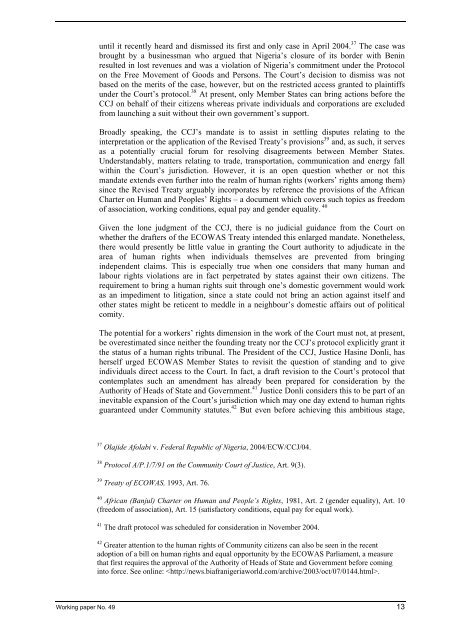The Social Dimension of Regional Integration in ECOWAS
The Social Dimension of Regional Integration in ECOWAS
The Social Dimension of Regional Integration in ECOWAS
You also want an ePaper? Increase the reach of your titles
YUMPU automatically turns print PDFs into web optimized ePapers that Google loves.
until it recently heard and dismissed its first and only case <strong>in</strong> April 2004. 37 <strong>The</strong> case was<br />
brought by a bus<strong>in</strong>essman who argued that Nigeria’s closure <strong>of</strong> its border with Ben<strong>in</strong><br />
resulted <strong>in</strong> lost revenues and was a violation <strong>of</strong> Nigeria’s commitment under the Protocol<br />
on the Free Movement <strong>of</strong> Goods and Persons. <strong>The</strong> Court’s decision to dismiss was not<br />
based on the merits <strong>of</strong> the case, however, but on the restricted access granted to pla<strong>in</strong>tiffs<br />
under the Court’s protocol. 38 At present, only Member States can br<strong>in</strong>g actions before the<br />
CCJ on behalf <strong>of</strong> their citizens whereas private <strong>in</strong>dividuals and corporations are excluded<br />
from launch<strong>in</strong>g a suit without their own government’s support.<br />
Broadly speak<strong>in</strong>g, the CCJ’s mandate is to assist <strong>in</strong> settl<strong>in</strong>g disputes relat<strong>in</strong>g to the<br />
<strong>in</strong>terpretation or the application <strong>of</strong> the Revised Treaty’s provisions 39 and, as such, it serves<br />
as a potentially crucial forum for resolv<strong>in</strong>g disagreements between Member States.<br />
Understandably, matters relat<strong>in</strong>g to trade, transportation, communication and energy fall<br />
with<strong>in</strong> the Court’s jurisdiction. However, it is an open question whether or not this<br />
mandate extends even further <strong>in</strong>to the realm <strong>of</strong> human rights (workers’ rights among them)<br />
s<strong>in</strong>ce the Revised Treaty arguably <strong>in</strong>corporates by reference the provisions <strong>of</strong> the African<br />
Charter on Human and Peoples’ Rights – a document which covers such topics as freedom<br />
<strong>of</strong> association, work<strong>in</strong>g conditions, equal pay and gender equality. 40<br />
Given the lone judgment <strong>of</strong> the CCJ, there is no judicial guidance from the Court on<br />
whether the drafters <strong>of</strong> the <strong>ECOWAS</strong> Treaty <strong>in</strong>tended this enlarged mandate. Nonetheless,<br />
there would presently be little value <strong>in</strong> grant<strong>in</strong>g the Court authority to adjudicate <strong>in</strong> the<br />
area <strong>of</strong> human rights when <strong>in</strong>dividuals themselves are prevented from br<strong>in</strong>g<strong>in</strong>g<br />
<strong>in</strong>dependent claims. This is especially true when one considers that many human and<br />
labour rights violations are <strong>in</strong> fact perpetrated by states aga<strong>in</strong>st their own citizens. <strong>The</strong><br />
requirement to br<strong>in</strong>g a human rights suit through one’s domestic government would work<br />
as an impediment to litigation, s<strong>in</strong>ce a state could not br<strong>in</strong>g an action aga<strong>in</strong>st itself and<br />
other states might be reticent to meddle <strong>in</strong> a neighbour’s domestic affairs out <strong>of</strong> political<br />
comity.<br />
<strong>The</strong> potential for a workers’ rights dimension <strong>in</strong> the work <strong>of</strong> the Court must not, at present,<br />
be overestimated s<strong>in</strong>ce neither the found<strong>in</strong>g treaty nor the CCJ’s protocol explicitly grant it<br />
the status <strong>of</strong> a human rights tribunal. <strong>The</strong> President <strong>of</strong> the CCJ, Justice Has<strong>in</strong>e Donli, has<br />
herself urged <strong>ECOWAS</strong> Member States to revisit the question <strong>of</strong> stand<strong>in</strong>g and to give<br />
<strong>in</strong>dividuals direct access to the Court. In fact, a draft revision to the Court’s protocol that<br />
contemplates such an amendment has already been prepared for consideration by the<br />
Authority <strong>of</strong> Heads <strong>of</strong> State and Government. 41 Justice Donli considers this to be part <strong>of</strong> an<br />
<strong>in</strong>evitable expansion <strong>of</strong> the Court’s jurisdiction which may one day extend to human rights<br />
guaranteed under Community statutes. 42 But even before achiev<strong>in</strong>g this ambitious stage,<br />
37 Olajide Afolabi v. Federal Republic <strong>of</strong> Nigeria, 2004/ECW/CCJ/04.<br />
38 Protocol A/P.1/7/91 on the Community Court <strong>of</strong> Justice, Art. 9(3).<br />
39 Treaty <strong>of</strong> <strong>ECOWAS</strong>, 1993, Art. 76.<br />
40 African (Banjul) Charter on Human and People’s Rights, 1981, Art. 2 (gender equality), Art. 10<br />
(freedom <strong>of</strong> association), Art. 15 (satisfactory conditions, equal pay for equal work).<br />
41 <strong>The</strong> draft protocol was scheduled for consideration <strong>in</strong> November 2004.<br />
42 Greater attention to the human rights <strong>of</strong> Community citizens can also be seen <strong>in</strong> the recent<br />
adoption <strong>of</strong> a bill on human rights and equal opportunity by the <strong>ECOWAS</strong> Parliament, a measure<br />
that first requires the approval <strong>of</strong> the Authority <strong>of</strong> Heads <strong>of</strong> State and Government before com<strong>in</strong>g<br />
<strong>in</strong>to force. See onl<strong>in</strong>e: .<br />
Work<strong>in</strong>g paper No. 49 13

















